radhat7下使用targetcli为多个启动器配置iSCSI访问控制
Posted
tags:
篇首语:本文由小常识网(cha138.com)小编为大家整理,主要介绍了radhat7下使用targetcli为多个启动器配置iSCSI访问控制相关的知识,希望对你有一定的参考价值。
测试环境说明:
测试环境一共使用4台服务器,两台Linux、两台Windows,一台Linux做为iSCSIServer,用Targetcli以iSCSI的方式提供存储共享服务,另外三台使用iSCSIServer上的存储资源,各自访问各自的资源,相互之间不能看到对方的存储资源,做到资源访问控制。
iSCSI Server
OS: Red Hat Enterprise Linux Server release 7.0
IP:10.20.1.100
Client
OS:Windows Server 2008 R2
IP:10.20.1.55
OS:NeoKylin Linux 6.5
IP:10.20.1.56
OS: Windows Server 2008 R2
IP:10.20.1.57
三台Client已经把基础环境配置完毕。
iSCSI Server配置过程
1、一些基础配置,目的以能安装使用targetcli,主要配置IP,关闭防火墙、yum源,安装targetcli需要python环境,在进行系统安装时要把python包选上。:
[[email protected] /]# vi /etc/sysconfig/network-scripts/ifcfg-ens192 TYPE=Ethernet BOOTPROTO=none IPADDR=10.20.1.100 NETMASK=255.255.255.0 GATEWAY=10.20.1.254 NAME=ens192 ONBOOT=yes [[email protected] /]#systemctl stop firewalld
2、yum源配置。
[[email protected] /]# cd /mnt [[email protected] /]# mkdir rehl7 [[email protected] /]# mount /dev/sr0 /mnt/rehl7/ //虚拟光驱,提前做好的 [[email protected] /]# vim /etc/yum.repos.d/base.repo [base] name=base baseurl=file:///mnt/rehl7 enable=1 gpgcheck=0 [[email protected] /]# yum clean all //清除缓存 [[email protected] /]# yum makecache //重载缓存
3、磁盘分区,分区时最好使用LVM格式,以便后期对共享盘空间进行调整。
[[email protected] /]# fdisk -l Disk /dev/sdb: 536.9 GB, 536870912000 bytes, 1048576000 sectors Units = sectors of 1 * 512 = 512 bytes Sector size (logical/physical): 512 bytes / 512 bytes I/O size (minimum/optimal): 512 bytes / 512 bytes
系统区分完后还剩余500G空间,使用fdisk进行分区,将以上的设备/dev/sdb建立分区,并改变格式为LVM。
[[email protected] ~]# fdisk /dev/sdb Welcome to fdisk (util-linux 2.23.2). Changes will remain in memory only, until you decide to write them. Be careful before using the write command. Device does not contain a recognized partition table Building a new DOS disklabel with disk identifier 0x8fa166b8. Command (m for help): n Partition type: p primary (0 primary, 0 extended, 4 free) e extended Select (default p): p Partition number (1-4, default 1): First sector (2048-1048575999, default 2048): Using default value 2048 Last sector, +sectors or +size{K,M,G} (2048-1048575999, default 1048575999): Using default value 1048575999 Partition 1 of type Linux and of size 500 GiB is set Command (m for help): t Selected partition 1 Hex code (type L to list all codes): 8e Changed type of partition 'Linux' to 'Linux LVM' Command (m for help): p Disk /dev/sdb: 536.9 GB, 536870912000 bytes, 1048576000 sectors Units = sectors of 1 * 512 = 512 bytes Sector size (logical/physical): 512 bytes / 512 bytes I/O size (minimum/optimal): 512 bytes / 512 bytes Disk label type: dos Disk identifier: 0x8fa166b8 Device Boot Start End Blocks Id System /dev/sdb1 2048 1048575999 524286976 8e Linux LVM Command (m for help): w The partition table has been altered! Calling ioctl() to re-read partition table. Syncing disks. [[email protected] /]# partprobe /dev/sdb1 //重载分区表
4、创建LVM。在/dev/sdb1上分别创建PV、VG,并按照分区规划创建LV。
分区规划:
IP pv name lv name size
10.20.1.57 /dev/sdb1 iscsi_57 150G
10.20.1.56 /dev/sdb1 iscsi_56 150G
10.20.1.55 /dev/sdb1 iscsi_55 150G
LVM操作步骤:
[[email protected] /]# pvcreate /dev/sdb1 Physical volume "/dev/sdb1" successfully created [[email protected] /]# vgcreate iSCSI /dev/sdb1 Volume group "iSCSI" successfully created [[email protected] /]# lvcreate -L 150G -n iscsi_56 iSCSI Logical volume "iscsi_56" created [[email protected] /]# lvcreate -L 150G -n iscsi_57 iSCSI Logical volume "iscsi_57" created [[email protected] /]# lvcreate -L 150G -n iscsi_55 iSCSI Logical volume "iscsi_55" created [[email protected] /]# vgs VG #PV #LV #SN Attr VSize VFree iSCSI 1 3 0 wz--n- 500.00g 50.00g rhel 1 2 0 wz--n- 83.80g 0 [[email protected] /]# lvs LV VG Attr LSize Pool Origin Data% Move Log Cpy%Sync Convert iscsi_55 iSCSI -wi-a----- 150.00g iscsi_56 iSCSI -wi-a----- 150.00g iscsi_57 iSCSI -wi-a----- 150.00g home rhel -wi-ao---- 4.88g root rhel -wi-ao---- 78.92g
5、targetcli安装及iSCSI配置。配置本地服务器时为了好区分,需要提前修改iqn名,最好在后缀加上server的方式命名,以和Client区分
[[email protected] /]# yum install targetcli –y //安装iscsi 服务管理器 [[email protected] /]# systemctl start target //启动target服务 [[email protected] /]# systemctl enable target //将服务设置为开机自动启动 [[email protected] /]# yum install iscsi-initiator-utils //安装iscsi Initiator [[email protected] /]# vim /etc/iscsi/initiatorname.iscsi //修改iqn name InitiatorName=iqn.1994-05.com.redhat:iSCSIserver
运行iSCSI配置命令
[[email protected] etc]# targetcli Warning: Could not load preferences file /root/.targetcli/prefs.bin. targetcli shell version 2.1.fb34 Copyright 2011-2013 by Datera, Inc and others. For help on commands, type 'help'. /> ls //查看树状结构布局 o- / ........................................................ [...] o- backstores ............................................. [...] | o- block ................................. [Storage Objects: 0] | o- fileio ................................ [Storage Objects: 0] | o- pscsi ................................. [Storage Objects: 0] | o- ramdisk ............................... [Storage Objects: 0] o- iscsi ............................................ [Targets: 0] o- loopback ........................................ [Targets: 0] /> /backstores/block create iscsi55_data /dev/iSCSI/iscsi_55 //分别使用LV创建存储块。 Created block storage object iscsi55_data using /dev/iSCSI/iscsi_55. /> /backstores/block create iscsi56_data /dev/iSCSI/iscsi_56 //创建iscsi56-data Created block storage object iscsi56_data using /dev/iSCSI/iscsi_56. /> /backstores/block create iscsi57_data /dev/iSCSI/iscsi_57 //创建iscsi57-data Created block storage object iscsi57_data using /dev/iSCSI/iscsi_57. /> iscsi/ create iqn.1994-05.com.redhat:iSCSIserver //配置服务端iSCSITarget名,该名称已经在前面写入到文件里。 Created target iqn.1994-05.com.redhat:iSCSIserver. Created TPG 1. /> iscsi/iqn.1994-05.com.redhat:server/tpg1/portals create 10.20.1.100 //配置服务端IP及端口,端口默认为3260 Using default IP port 3260 Created network portal 10.20.1.100:3260. />ls //查看配置情况
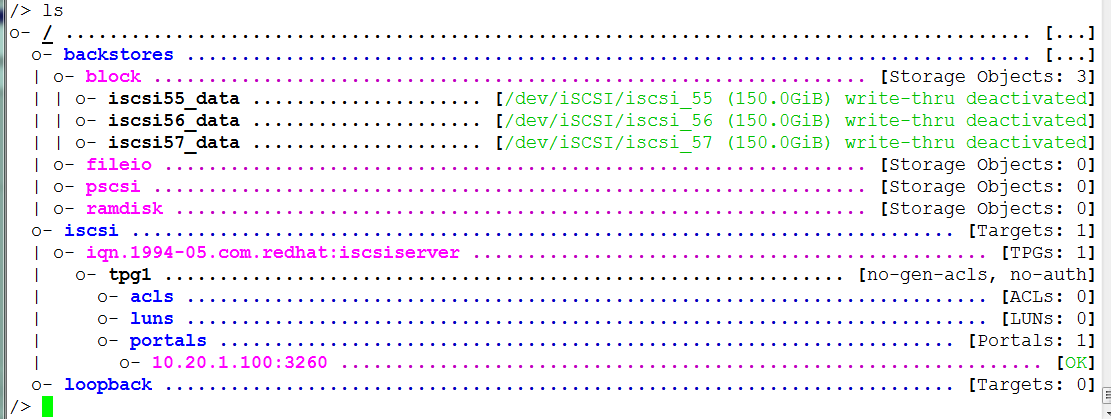
配置Client 启动器,3台客户端的启动器名已以提前修改为统一格式,粘贴复制文本文件。由于在targetcli中使用一些配置路径名太长,可以使用cd命令进入该项下,如果对命令不熟悉可以使用help查看帮助。在acls下使用carete命令分别创建57、56、55的启动器。
> cd iscsi/iqn.1994-05.com.redhat:iscsiserver/tpg1/acls /iscsi/iqn.19...ver/tpg1/acls> create iqn.1991-05.com.microsoft:mq57master Created Node ACL for iqn.1991-05.com.microsoft:mq57master

创建LUN,有两种方式,一种是在luns下创建,一种是在启动器下直接建。
首先测试在luns下创建,在luns项下每建好一个LUN,程序会自动将该LUN挂在所有acls下,所以要根据需求在acls下将多余的LUN删除。在luns下使用create创建LUN。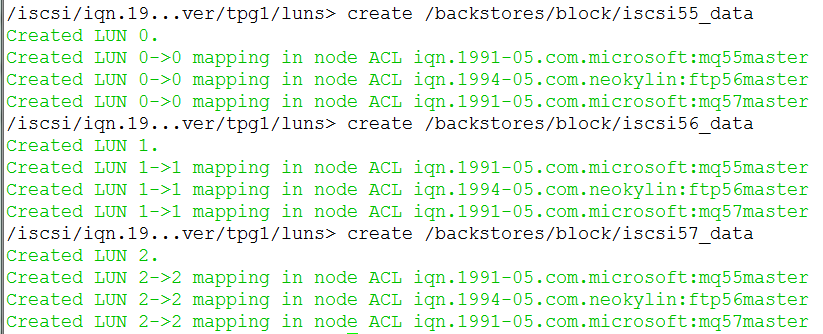
能看到acls下每个启动器上都有3个LUN。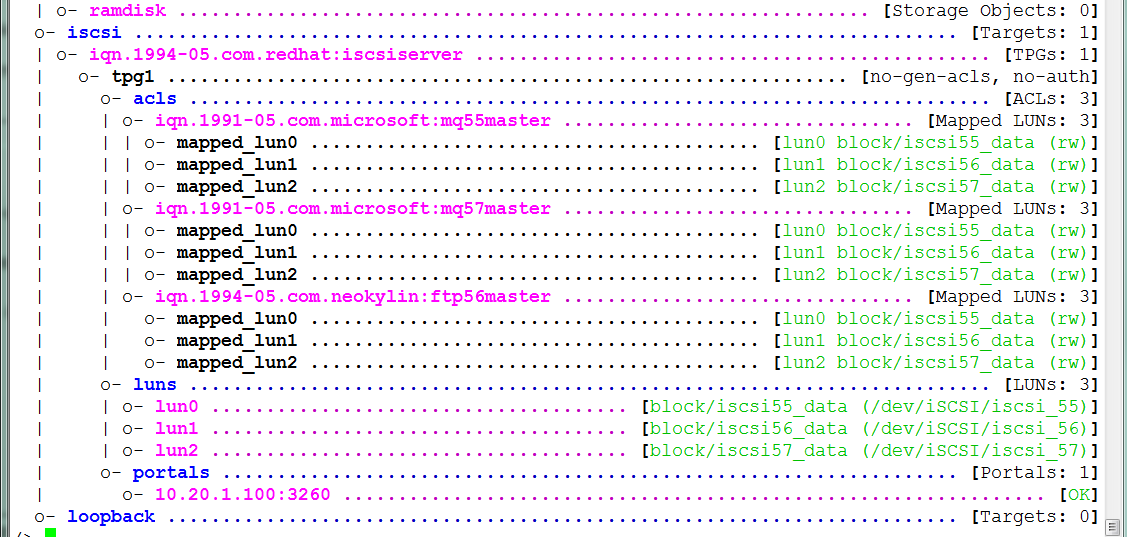
将多余的LUN删除。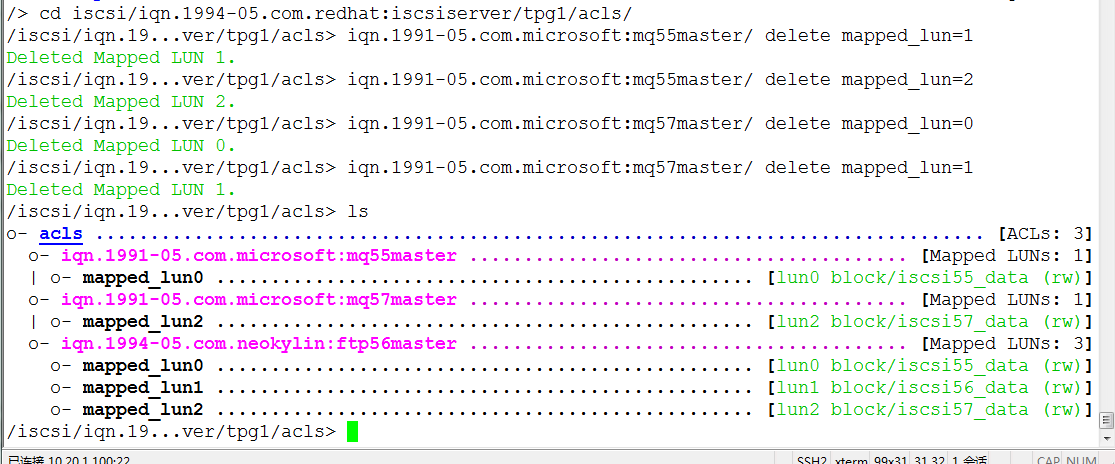
在启动器下创建,这种方式比较直接,在acls项下直接按需新建LUN,直接映射到对应启动器,一次到位,就是命令比较长。
先把原来的3个LUN删除,在acls下使用create创建。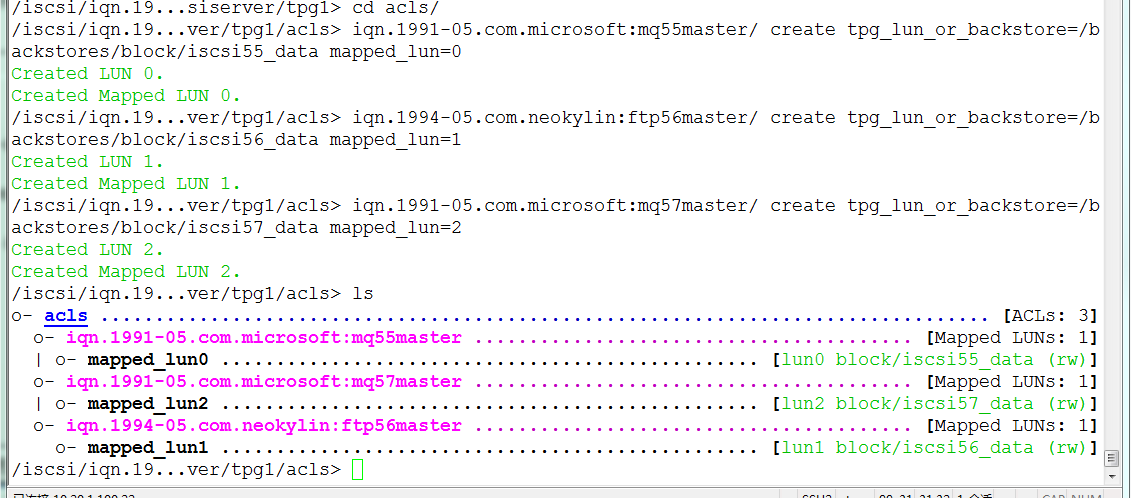
iSCSI配置完毕,看看整体效果: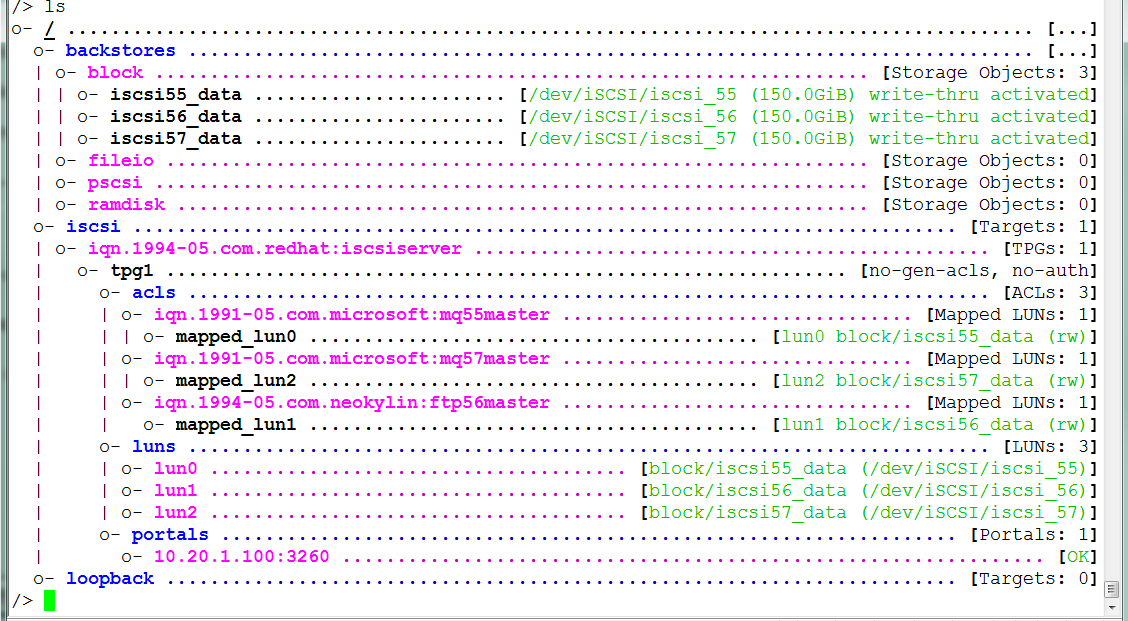
6、客户端配置
windows配置,这种windows挂iSCSI的配置网上教程比较多,这里就只写步骤不配图了。
在管理工具打开iSCSI发起程序,以下步骤:
1) 在目标中输入IP,点快速连接;
2) 弹出快速连接登陆成功报告,点击确定;
3) 在发现和收藏的目标里会有相应的内容;
4) 在卷和设备点击自动配置,会自己获得设备;
5) 点开服务管理器—存储—磁盘管理—在新加硬盘上右键点联机;
6) 初始化为MBR,然后格式化磁盘。
Linux操作系统配置方法,linux按步骤配图
1) 使用命令发现资源
[[email protected] ~]# iscsiadm -m discovery -t sendtargets -p 10.20.1.100

2)使用命令登陆资源
[[email protected] ~]# iscsiadm -m node T iqn.1994-05.com.redhat:iscsiserver -p 10.20.1.100


3)使用fdisk检查并分区
[[email protected] ~]# fdisk –l

检测到一块161G的设备,进行分区,因为以后可能对磁盘有扩容或缩减的操操作,最好将磁盘格式改为LVM。
[[email protected] ~]# fdisk /dev/sdc [[email protected] ~]# partprobe /dev/sdc1 //重读分区表
4)创建LVM并进行格式化
[[email protected] ~]# pvcreate /dev/sdc1 //创建PV Physical volume "/dev/sdc1" successfully created [[email protected] ~]# vgcreate FtpDataGroup /dev/sdc1 //创建VG Volume group "FtpDataGroup" successfully created [[email protected] ~]# lvcreate -l 38398 -n FtpData FtpDataGroup //创建LV Logical volume "FtpData" created [[email protected] ~]# mkfs.xfs /dev/FtpDataGroup/FtpData //格式化为xfs
5)挂载新分区
由于是网络磁盘,使用自动挂载方式时最好使用UUID来挂载,先查看UUID

磁盘挂载,注意千万不要忘记netdev前面的下划线。小心万劫不复。。。。
[[email protected] ~]# vim /etc/fstab

mount –a 一下 df –h查看分区挂载,完成。
配置完成后重启系统,确定能正常识别新加盘配置完成。
以上是关于radhat7下使用targetcli为多个启动器配置iSCSI访问控制的主要内容,如果未能解决你的问题,请参考以下文章